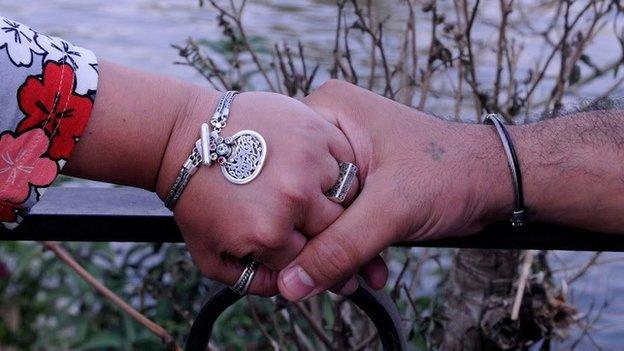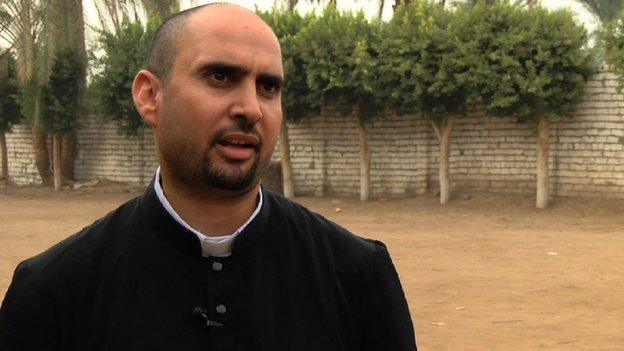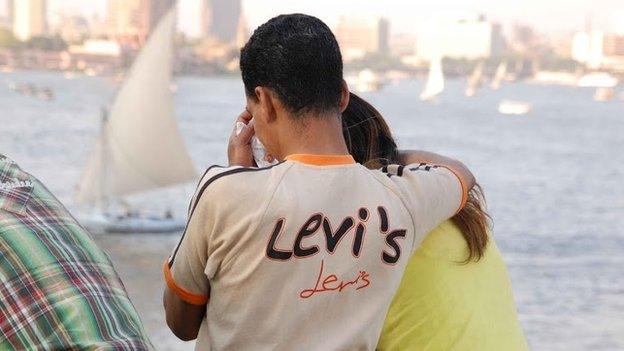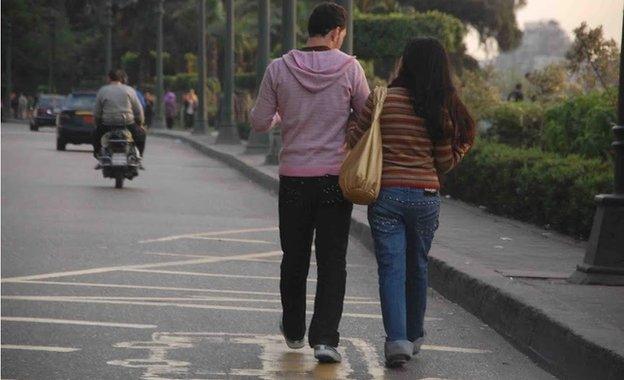Egypt: The forbidden love of interfaith romances
- Published

It is difficult for Egyptian interfaith couples to marry, and doing so can have dire consequences
"We had a five-year romance, but I never even touched her hand," says Tareq, as he remembers his relationship with fellow university student Howaida.
Asking her hand in marriage posed an even bigger challenge.
"I was very hesitant because all my dreams could have been shattered once I admitted my feeling," he says. "She was very likely to refuse a relationship with me because it would be against traditions."
Tareq is an Egyptian Muslim, while Howaida was a Coptic Christian.
Interfaith marriages are increasingly unacceptable in Egypt; couples must be ready to pay a hefty price.
Despite this, Howaida accepted Tareq's proposal.
"That was against all my expectations," he says. "She pledged to overcome all hurdles so we could marry. It was the happiest moment of my entire life."
But the hurdles they would encounter soon would prove too big for their relationship to continue.
Violent response
Religion is an incredibly sensitive issue in Egypt, with many Christians and Muslims refusing to accept people leaving their congregation.

George Matta, a Christian pastor, says people are safer choosing someone from their own religion
Religious leaders often see inter-faith marriage an attempt to recruit members from the other religion.
Fr George Matta, pastor of St George Church at Ezbet Hanna Ayoub in Menya, Upper Egypt, suggests that the culture in the Egyptian countryside does not accept interfaith relationships.
"My advice to young people is that they should choose their life partner from their own religion," says Fr Matta.
"This is just a piece of advice. We still have a very long way to go before we have open-minded communities like the West," he says, adding that he believed attitudes should change.

Under Egyptian law, Christian men must convert to Islam to marry a Muslim woman
Last year, a Muslim man was killed and five others were injured in clashes that took place in a remote village in Menya province. During the same incident, five Christian houses were set on fire.
The fighting erupted because of a relationship between a Muslim girl and a Christian neighbour.
Ahmed Attallah, an Egyptian writer who studies sectarian clashes, says the same story happens frequently. "Love is behind most of the sectarian clashes but it is hardly mentioned in official papers," he says.
"The authorities may blame evangelisation, apostasy or even abduction. But they never admit that there are simply love stories behind clashes."
Restrictive law
Aya and Milad's relationship started in Tahrir Square in the middle of the 2011 Egyptian revolution.
But after more than three years together, they feel frustrated. They can't marry in Egypt because Milad is a Christian, while Aya is a Muslim woman.
Under Egyptian law, Milad would have to convert Islam, even though a Christian woman can marry a Muslim man without having to convert.
The couple considered travelling abroad to marry and start a family. But even that would not solve their problem.
"Even though we would sign a civil marriage document, we would not be able to come back to Egypt," says 24-year-old Aya.
"The authorities will never approve our marriage or register our children as Egyptians. We must then live outside Egypt until we die."
Ahmed Attallah says that interfaith marriage has effectively become prohibited in Egypt.
"When a Christian woman goes to a notary to register a marriage with a Muslim man, the officials tell her that she must have a letter of approval from the Church," he says.
"The Egyptian Church has consistently refused to approve marriages between different Christian sects, let alone different religions." he adds.
Heavy price
Abeer, who used to be a Christian, has been married to Mohammed, a Muslim, for 24 years.
They live in Menya, the same province that saw the bloody sectarian clashes more than year ago, and they say the public response to relationships such as theirs has become much more violent.
"When we got married, people actually tended to congratulate us everywhere we went in the village" Mohamed says.
However, the couple - like many others in their situation - still had to pay a heavy price for their relationship.

People in interfaith relationships can often be cast out by their families in Egypt
Abeer's family disowned her for marrying a Muslim and converting to Islam. When she ran into her father after the wedding, she remembers that he ignored her and said: "My Abeer is dead".
Tareq, who fell in love with Howaida at university, could not bear to make her suffer in the same way, even though she was prepared to convert to Islam.
They split up in 2009.
Tareq says he feared his relationship with Howaida would put her in danger from her own family.
"I did not want to get her into trouble which could end with her family killing her," Tareq says.
He adds: "I'm now married a wonderful, decorous veiled woman and have lovely children, may God save them and her."
"But for me, I can't say that I 'love' my wife."
"I still love the Christian woman I used to meet. I will never forget her."
The names of some of the contributors have been changed at their request.